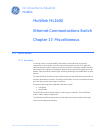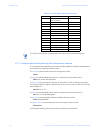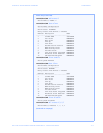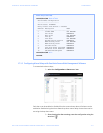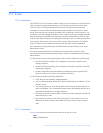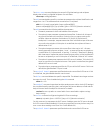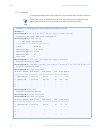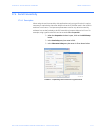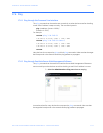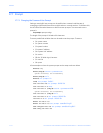CHAPTER 17: MISCELLANEOUS COMMANDS E-MAIL
MULTILINK ML1600 ETHERNET COMMUNICATIONS SWITCH – INSTRUCTION MANUAL 17–7
The show smtp command displays the current SMTP global settings and recipients
displays the currently configured recipients of e-mail alerts.
show smtp <config|recipients>
The
add command adds a specific id, where id represents the recipient identification and
ranges from 1 to 5. The software allows a maximum of 5 recipients
add id=<1-5> email=<email-addr> [traps=<all|none|S|R|E>]
[events=<all|none|I|A|C|F|D>] [ip=<ip-addr>] [port=<1-65535>] [domain=<domain>]
The
add command has the following additional parameters:
•The
email parameter is the e-mail address of the recipient.
• The optional
traps parameter represents the trap filter. If value is all, all traps of
any type will be sent to this recipient. If value is none, no traps are sent to this
recipient. Value can also be a combination of 'S' (SNMP), 'R' (RMON) and 'E'
(enterprise). For example,
trap=SR means that SNMP and RMON traps will be sent
via e-mail to the recipient. If this option is not defined, the recipient will have a
default value of “all”.
• The optional
events parameter is the event filter. Value can be “all” - all event
severity types will be sent to recipient, “none” - no event will be sent to recipient or
a combination of 'I' (informational), 'A' (activity), 'C' (critical), 'F' (fatal) and 'D' (debug).
With “
event=ACF” implies that events of severity types activity, critical and fatal will
be sent to recipients by e-mail. If this option is not defined, a value of “all” is taken.
• The optional
ip parameter represents the SMTP server IP address. This is the SMTP
server to connect to for this particular user. If this option is not defined, the global/
default SMTP server is used.
• The optional
port parameter specifies the TCP port of the SMTP server. If this is not
defined, the global default TCP port is used.
The
optional domain parameter specifies the domain name of the SMTP server. If this
is not defined, the global default domain name is used.
The
delete command deletes the specific id specified. The deleted id no longer receives
the traps via e-mail. The
id is added using the add command
delete id=<1-5>
The
sendmail command customizes (and also sends a test e-mail to check SMTP settings)
the e-mail delivered by specifying the e-mail subject field, server address, to field and the
body of the text. See the example in this section for details.
sendmail server=<ip-addr> to=<email-addr> from=<email-addr> subject=<string>
body=<string>
The
server command configures the global SMTP server settings.
server ip=<ip-addr> [port=<1-65535>] [retry=<0-3>] [domain=<domain>]
For this command,
ip represents the SMTP server IP address, port the TCP port to be used
for SMTP communications (default is 25), and
retry specifies how many times to retry if an
error occurs when sending e-mail (from 0 to 3 with default of 0).
The
optional domain parameter specifies the domain name of the SMTP server.





